Rejoice ! We have (almost) convinced the climate-skeptics. Apart from a few bad apples, no one denies the effects of human activites on climate change. On the other hand, now comes the most difficult part: change. Change requires to act, and when and how to do it. Change does not please everyone. For instance, lobbies who spend millions to continue their very lucrative, planet-destroying activities.
This publication by the University of Cambridge highlights the 12 discourses of climate delay, perceived as the usual pretexts to justify inaction or inadequate efforts. In other words, these discourses agree that climate change is a problem, but find reasons to do nothing. This article should therefore make it possible for you to identify a discourse of climate delay and then refute it.
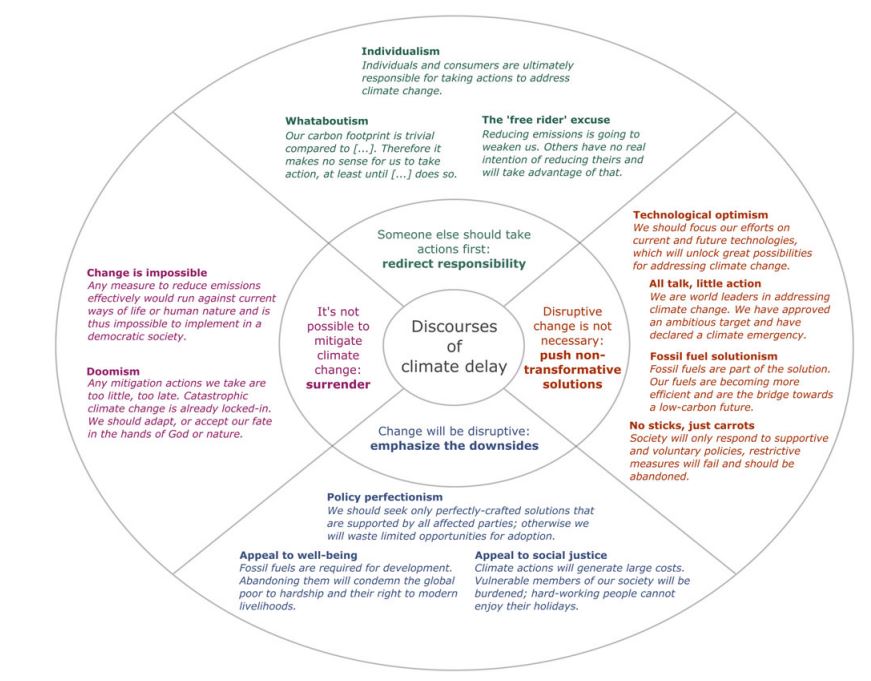
First, I would like to raise a few points before examining these 12 discourses: it is essential to stick to the facts and leave aside emotions as much as possible. For instance, the debate around nuclear energy in France is far too irrational and leaves only losers: the French. Secondly, there is a symbolic aspect to this. A small change can ultimately have a huge impact . I’m of course referring to tipping points, a concept that you’ll come upon several times while reading the answers given below.
PS: exceptionally, I will update this article in the future with the best (sourced) arguments that I will read in response. I think it’s very important that readers are equipped with the best arguments to refute the hagglers advocates of green growth and other transhumanists.
LIST OF THE 12 DISCOURSES AND HOW TO RESPOND TO THEM
abandonment
Excuse 1: Climate doomism
Argument : ‘Any actions we take are too little, too late.’
Answer : Even if this speech of doom has a lot of success, especially in France through personalities such as Yves Cochet, it’s wrong. It’s wrong to say that we are already doomed. Wrong to say that billions of people are already condemned to die. Why ? Because the IPCC says so : we still have time to make the necessary changes to live in a sustainable world. Valérie Masson Delmotte repeated it during her speech in front of the Citizen’s Climate Convention: every month counts. But that doesn’t mean that ‘ it’s too late ‘. Above all else, it’s an issue of political and societal inertia (an abrupt transition will obviously have consequences), before being a problem of physical inertia .
It is of course too late to completely prevent some damage (social, environmental, etc.). But there is no point in exaggerating what science arleady tells us about climate change (even if it’s good for sales…). So let’s avoid doomism, the equivalent of watching your kitchen burn and say ‘ we can’t do anything, it’s over’ while the fire spreads to the other rooms.
Lastly, there is no deadline. Of course it would have been better to act 20 or 30 years ago. But it’s not because we haven’t acted in 2025 or even in 2030 that all is lost. The point is that the longer we wait, the more catastrophic it will be (with nasty feedback loops on top of it).
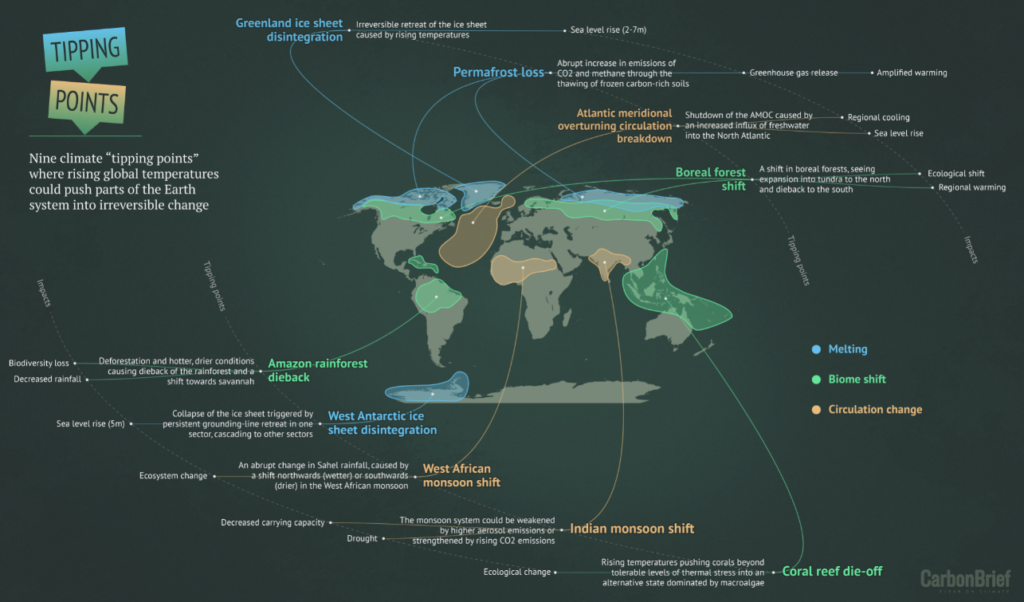
Excuse 2: change is impossible
Argument : ‘Any measure taken to reduce emissions is not feasible, because people will never want to change’. ‘In a democracy, such changes will never be accepted”
Answer : It is wrong to say that it is in our nature to destroy our environment. On multiple occasions, Sébastien Bohler has been misquoted about his book The human bug . Thiis article completely refutes S. Bohler’s arguments, arguing that he completely forgets to specify that somehuman societies have lived for centuries without destroying their environment (as we are currently doing). This discourse is extremely dangerous because it amounts to pretending that ‘ it’s not my fault, it’s in our nature ‘! Well no. You’re wrong, Sebastian.
Regarding the argument of democracy. Even if our democracy is imperfect, the Citizen Climate Convention was the perfect example that non-expert citizens can understand the issue and propose meaningful solutions to it. In China or in Venezuela for instance, I don’t think it would have been possible for this convention to see the light of day ! Of course everything is not perfect, but change remains possible.
Furthermore, democracy can be more effective at the local level than at the national level (even international…). Change will happen much faster in a town of 20,000 inhabitants with a brave mayor than with a pathological liar for a president and a prime minister who thinks ‘biodiversity’ is a 70s rock band .
Finally, in a democracy, more than in any other political system, you are free to act and take your own initiatives. To express your disagreement. To my knowledge, I have not seen Greta criticize the Chinese president’s inaction against climate change in Tian’anmen Square.

Redirection of responsibility
Excuse 3: individualism
Argument : ‘The responsibility lies with someone else’. ‘Change will only come from individuals’.
Answer : There is no such thing as society . Thanks Margaret, but no thanks. Individuals cannot be asked to solve a systemic problem alone .
This subject has been previously mentioned in Total’s responsibility for emissions . Who is responsible for emitting greenhouse gases: Total, or the one who drives his car all night long using gasoline? If we take into account scope 3 of the Greenhouse Gas Protocol allowing organizations to calculate their GHGs, the responsible party is Total, and not the citizen. We could also point out that the presence of 30,000 lobbyists representing interest groups, all in Brussels is no coincidence (just like the billions invested in communication to encourage individuals to consume more).
Let’s add some nuance: of course the citizen has a part to play in this. He can vote with his money , boycott certain companies, do his part just like Carbone 4 tells us to. But this shouldn’t divert us from the fact that politicians and private companies are responsible for shaping those individual choices and driving down fossil fuel emissions.
Excuse 4: Whataboutism
Argument : ‘France only produces 1% of global carbon dioxide, the Chinese are the ones to blame! They should start making some efforts first, then we’ll see about it.”

Answer : This is the most common argument. We all know someone who constantly tries to find a reason not to change anything. Sadly, it’s the textbook answer of someone who doesn’t understand the difference between the national greenhouses gases inventory and the carbon footprint . Often, it’s someone who blames large emitters such as China, without understanding that the Chinese pollute by manufacturing consumer products… Which he will end up consuming. The High Council for the Climate has also highlighted this in its latest report on France’s carbon footprint .
The aviation sector is also an expert in redirecting responsibility: ‘ plane traffic only accounts for 3% of global emissions, which is peanuts compared to the impact of cars or maritime transport !
But…. EVERYONE must question themselves. Given the reductions in CO2eq emissions that we must achieve every year, 1% is an enormous step forward. There will be no small profits. Any drop in emissions is worth it. Just because someone else pollutes more than you do doesn’t mean you shouldn’t do anything about it. If I had waited for every American to have a carbon footprint of 2T CO2eq/year before doing something, I would still be working in finance.
Not only is setting an example probably the best way to bring about change, but a tipping point can also stem from a minor change. Needless to say, from an ethical point of view, whether you are Chinese, Brazilian or French, everyone should switch their way of life to a sustainable one (this is valid for office workers, but also forJoaquin Phoenix and Madonna …). Finally, CO2 has no borders. What you emit can have very serious consequences elsewhere: this is what is called, among other things, climate injustice .
Excuse 5: the Free-Rider
Argument : ‘If we take the lead on climate change mitigation, others will take advantage of us.’ Donald Trump, on the Paris Accords
Answer : The situation will be catastrophic if we do not prepare for it. Many policies aiming for adaptation often have dual benefits since they make us more resilient AND reduce our GHG emissions . To this effect, the Senate issued a report in 2019 , with two sentences that respond to the Free-Rider excuse:
” If mitigation and adaptation are today considered as complementary, we note that in minds and practice, adaptation policies still suffer from a persistent lack of recognition and legitimacy .”
“It is too often through the prism of mitigating GHG emissions only, that is to say from a preventive standpoint, that stakeholders consider climate issues. ”
If we do not take the lead on climate change adaptation and mitigation, the consequences will be dire. The latest IPBES report on biodiversity and pandemics reminds us of this. With Covid-19, we got a glimpse of the devastating effect of a pandemic on our health, our economies and our social stability. Today, the same human activities cause:
👉 biodiversity collapse
👉 climate change
👉 increased risk of PANDEMICS.
Unfortunately, this link has not been mentioned even once by the French government since the start of the crisis, in March 2020. Out of ignorance, or petty electoral interests.
In addition, the latest IPCC 1.5 report confirms that there will be co-benefits to adaptation:

Finally,the cost of inaction exceeds the cost of action. Otherwise said, consequences of global warming abover 1.5°C will cost more than what we need to spend to avoid exceeding 1.5°C. It is in our interest, even from an economic point of view, to adapt quickly.
NEWSLETTER
Chaque vendredi, recevez un condensé de la semaine, des infographies, nos recos culturelles et des exclusivités.
+30 000 SONT DÉJÀ INSCRITS
Une alerte pour chaque article mis en ligne, et une lettre hebdo chaque vendredi, avec un condensé de la semaine, des infographies, nos recos culturelles et des exclusivités.
“There is no need for a radical change”
Excuse 6: technological optimism
Argument : ‘Technology will save us! The Zero Carbon plane will be here in 2035! Nuclear fusion is coming soon!

Answer : Alongside whataboutism, techno-solutionism is one of the most commonly used discourses. You don’t need to change your way of life, a backstop technology will come and save us all . Not only is this an extremely hazardous bet, but at the moment we don’t have one iota of proof showing that clean energy has the potential to replace all existing energy. The Zero Carbon plane in 2035, which French prime minister Elisabeth Born mentions at every occasion, is complete and utter bullshit and has been debunked by several specialized engineers . Regarding nuclear fusion, it would only be a part of the energy mix . Unfortunately, energy will not save us all.
Moreover, on average, it takes about 10 years between the publication of a scientific finding and the filing of a patent. And that’s not even mentioning market placing, deployment, etc.
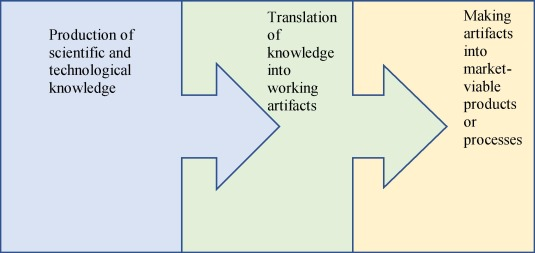
For the unconvinced, here are some arguments from French engineer Françoise Laugée .
Excuse 7: Words, Very Little Action
Argument : “We are brave and have announced a historic plan, France will be a leader in the fight against climate change! These words are from Laurent Fabius, on the verge of tears at the end of COP21 .
Answer : The politican’s discourse, who announces ‘historic measures’, without being able to prove it. Furthermore, it is generally impossible to measure the effectiveness of measures announced by a government. This discourse is very popular in the UK, but France is far from innocent. For example, even though we must reduce our emissions by 7.6% every year, Valérie Masson-Delmotte reminds us in front of the CCC that our emissions have stagnated for the past few years … The figures clearly show the gap between the National Low Carbon Strategy (SNBC), the objectives to be achieved each year, and reality.

If only we had listened to Elisabeth Borne a little over a month ago, when she announced that France will be a pioneer in reducing emissions through massive investments in bicyles! Massive being 20 million euros, by the way.
Another example is the European Parliament announcing a 60% reduction in emissions by 2030. Not only is their project completely unsustainable (just look at their nice green growth graph that I debunked on Twitter), but if France goes through with this, according to the SNBC, it would mean a 15% cut in emissions before 2030.

Excuse 8: energy efficiency
Argument : ‘Cars use up less and less oil, soon they won’t even need oil anymore!’
Answer : This is a common discourse, supported by oil lobbies cashing out millions to back up this argument. It is easily refutable thanks to the Jevons paradox and the concept of rebound effects. Moreover, all the advocates of the ‘energy transition’, in particular electric cars, do not seem to understand that we need raw materials which do not exist in infinite supplies.
If you hear someone say ‘don’t you worry, the electric car will replace the thermal car and everything will be fine!’, ask them what raw materials are needed, where they are mined, how much we have left, according to a scenario of constant demand and exponential demand.
Also, given how urgent it is to act, energy efficiency cannot meet the climate objectives of the Paris Agreement without sufficiency.
Excuse 9: Rely on volunteerism, don’t restrict/prohibit
Argument : ‘Taxing or prohibiting citizens from doing something is counterproductive, they will change through common sense, on a voluntary basis’
Answer : Need I remind you of the outcry and the swaying remarks issued by most media outlets in France following the Citizen Climate Convention’s propositions ? These citizens are offering solutions to lower our emissions, and we are comparing them to green extremists. They have to courage to suggest quotas for leisure air travel, which is a crucial aspect of the fight against climate change, and this is the reaction they get.

Believing that all French people will strive for an exemplary carbon footprint without regulatory constraints is ludicrous and easily disproved. Just go and ask Bernard Arnaud if he’s ready to lower his carbon footprint to 2t CO2eq/year. Do you thinkNabilla will stop flying on a voluntary basis?
Empasize the downsides.
Excuse 10: policy perfectionism
Argument : ‘It’s not worth it’. ‘If we’re asked to pass this policy now, the entire country will be paralyzed by strikes.’ ‘Beware of the yellow vests.’
Answer : Our dear and beloved politicians love to use this as a rethorical excuse to do nothing. Whatever the policy, it will cause strikes, riots, and the country will be paralyzed ‘. First of all, if a policy aims to change things for the better, and it is not accepted by public opinion, it’s because the political communication strategy is flawed.
Waiting for perfection to put forward a new policy is the best way to encourage inaction and is a grave mistake. It is through dialogue, and dialogue only that concerned parties will come to an agreement. Once again, taking a political decision isa balance between upsides and downsides, and there will always be winners and losers. This shouldn’t be an excuse to do nothing, especially out of electoral interest.
Excuse 11: Abandoning fossil fuels is abandoning the poor
Argument : ‘Without oil, w’re going right back to the Stone Age! What about developing societies ? Do we just leave them hanging?
Answer : The green growth enthusiast’s favorite discourse. The famous “growth has pulled billions of people out of poverty” discourse. Check out Thomas Piketty’s work, who has torn this argument apart in the thousand pages of his book, “Capital in the 21st century’. It is wrong to claim that fossil fuel driven growth systematically pulled people out of poverty: it hasn’t been the case in France for the last 25 years. If you want to save yourself some time, just send whoever is using this argument the following tweet:

Furthermore, we should are talking about transition , degrowth, , not about depression or collapse . We’re not going to switch from our current society to the stone age in the blink of an eye. This scaremonger discourse tends to scare people and block all kinds of initiatives. For example, this argument has been widely used during the Covid-19 crisis: “There you go, you wanted degrowth, now you have it ! See the result?”. Equating a pandemic with degrowth just because it provokes a decrease in the GDP is as absurd as congratulating someone on losing weight following an arm amputation. For more information on degrowth, read our interview with Timothée Parrique.
Excuse 12: The cost of climate action will reduce social justice
Argument : ‘Binding measures will affect the least affluent first and are unjust.’
Answer : This may be the hardest discourse to counter. First of all, remember that restrictive measures will affect the rich most, because they are the biggest polluters. The detail in this graph is clear:
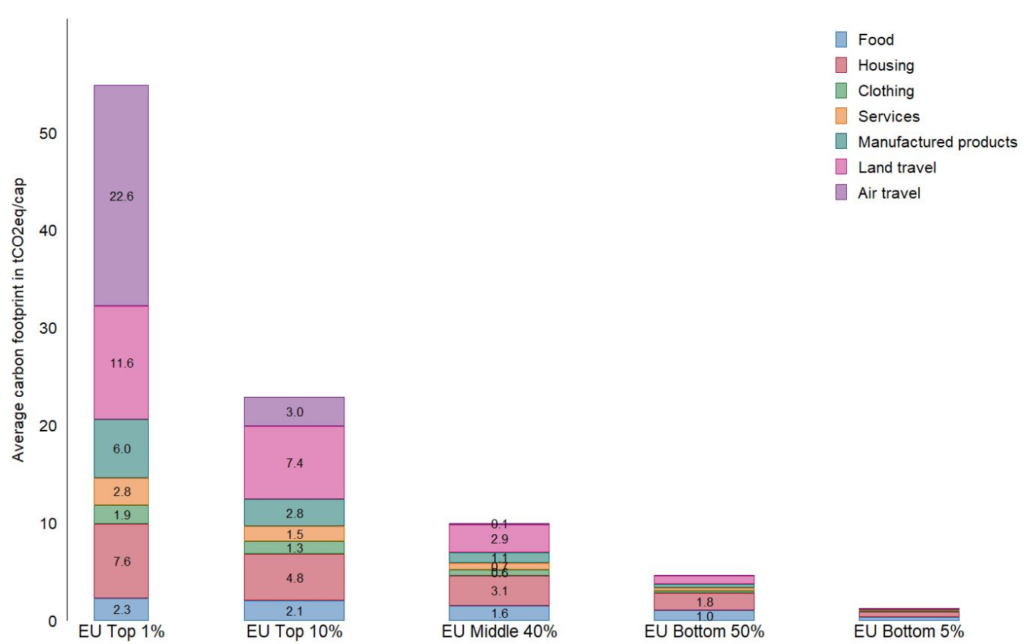
All this woud lead us right into a shrinking economy . First, degrowth – as the word suggests – implies a reduction in production and consumption in order to limit social and environmental damage. More precisely: it means slowing down and shrinking economic life in the name of sustainability, social justice, and well-being.
Second, degrowth incoporates three main values: autonomy , sufficiency , and care . Autonomy is a freedom principle that advocates for temperance, self-management, and direct democracy. Sufficiency is a matter of distributive justice defending the right for everyone to own everything they need to satisfy their basic needs – in the short and long term – but also that posessions should not exceed ecological thresholds. . Care advocates for a stop to exploitation and violence and promotes solidarity between humans and non-humans.
PS: regarding plane travel, quotas are more socially just than taxes. This avoids that a person can pollute just by compensating with money, and that the lowest incomes are more affected by the measure.
The last word
The climate inaction discourses described above are not news and we will keep on hearing them for at least another decade. They are just as dangerous as climate denialism for the simple reason that they lead to the same result: inaction.
You will hear these excuses on a daily basis. Either because of lack of knowledge, intellectual dishonesty or simply because the magnitude and complexity of this issue paralyzes us and leads to inaction. It’s a totally understandable feeling. Often, when you come out of denial, very strong feeling come up and mark you for life. But it is through action that optimism finds its genesis.
I would like to finish on the importance of the tipping point : keep in mind that a warned/convinced person is worth two. Undoubtedly, the road will be long, demanding, hard and exhausting. But if you’re convinced that we are heading to our doom if nothing changes, keep calm andkeep your attention and critical thinking capablity up.
BONUS NOT TO BE MISSED: the cards of the 12 climate inaction speeches !




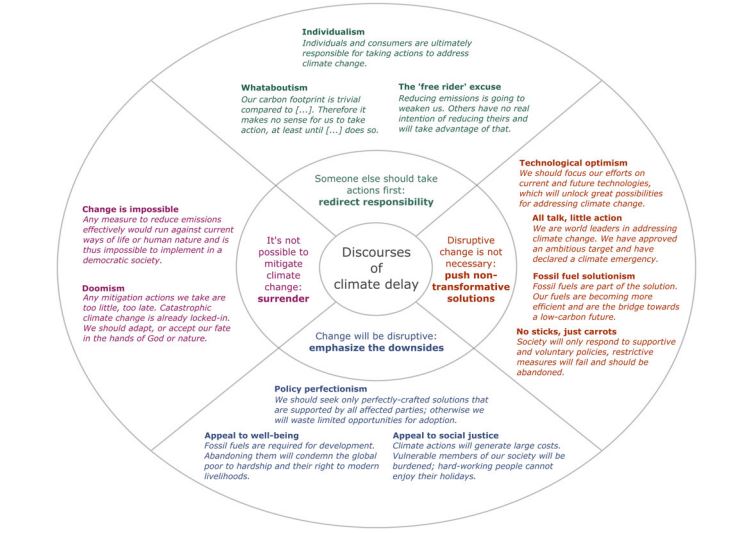











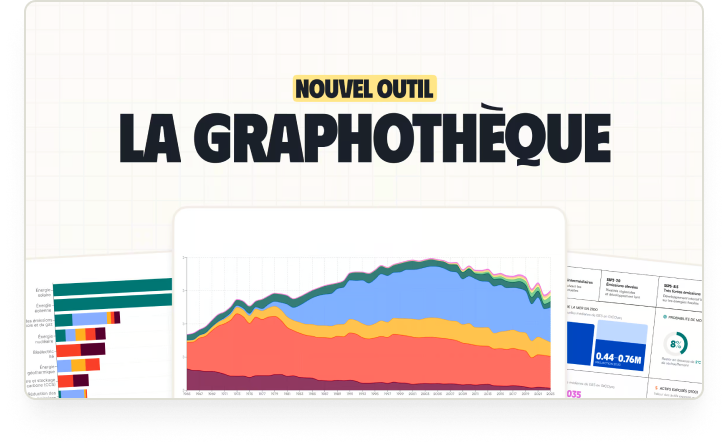
One Response
“A few bad apples”?
More like a massive propaganda campaign run by the oil industry & it’s Conservative supporters. It’s been very successful at delaying action on reducing emissions, & it’s gaining followers every day.
https://www.theguardian.com/business/2020/jan/08/oil-companies-climate-crisis-pr-spending